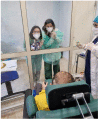Is the "Family Glass Cabin" Useful to Safely Allow Inpatient-Caregiver Interaction in the COVID-19 Era? A Pilot Study on Severe Acquired Brain Injury
- PMID: 35329947
- PMCID: PMC8950736
- DOI: 10.3390/jcm11061623
Is the "Family Glass Cabin" Useful to Safely Allow Inpatient-Caregiver Interaction in the COVID-19 Era? A Pilot Study on Severe Acquired Brain Injury
Abstract
Acquired Brain Injury (ABI) is a life-changing event that can have a devastating impact on all aspects of a person’s functioning. Patients with ABI present several behavioral problems that have worsened during the COVID-19 pandemic. This study aimed at investigating the role of a “Family Glass Cabin” (FGC) both in improving cognitive function and communicative abilities of people with ABI and in potentiating the mental health of their caregivers. Fifteen subjects affected by ABI and their caregivers were enrolled in this experimental study. Training was performed through the FGC and was based on either psychoeducational sessions for the caregivers or cognitive stimulations for the patients. The participants attended biweekly meetings for 12 consecutive weeks. Each participant was assessed by means of a complete psychometric and clinical battery, before (T0) and after (T1) the training. We found significant changes in all patients’ outcomes, including global cognitive function and communication abilities (p < 0.01), as well as an improvement in caregivers’ well-being. Our data suggest that the physical presence of the caregiver in the rehabilitation setting, using a safe setting such as the FGC, can be a valuable means to increase ABI patients’ functional recovery and reduce caregivers’ anxiety and emotional burden.
Keywords: Acquired Brain Injury; COVID-19 pandemic; caregiver’s burden; family glass cabin.
Conflict of interest statement
The authors declare no conflict of interest.
Figures
References
-
- [(accessed on 7 February 2022)]. Available online: https://covid19.who.int/
LinkOut - more resources
Full Text Sources


